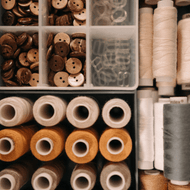The Rise of Sustainable Sewing Contractors: Embracing Eco-Friendly Practices
Posted by Elena Carné on Sep 28th 2023
In recent years, the global fashion industry has witnessed a growing concern for sustainability and eco-friendliness. As consumers become increasingly conscious of the environmental impact of fast fashion, there's a significant shift towards more responsible and ethical practices. This has led to the rise of sustainable sewing contractors who are committed to reducing their carbon footprint and adopting eco-friendly approaches. In this blog, we will explore the eco-conscious initiatives that have taken center stage among sewing contractors, along with the benefits they bring to the industry and the planet.
Embracing Organic and Sustainable Fabrics
One of the primary ways sustainable sewing contractors contribute to a greener world is by choosing organic and sustainable fabrics. Instead of relying solely on conventional materials, these contractors opt for fabrics made from eco-friendly fibers such as organic cotton, hemp, bamboo, and Tencel. By doing so, they minimize the use of harmful chemicals and pesticides, reduce water consumption, and support a more circular and regenerative textile industry.
Implementing Waste Reduction Strategies
Sustainable sewing contractors understand the importance of waste reduction in their production processes. They take proactive measures to minimize fabric waste by employing efficient cutting techniques, pattern optimization software, and responsible inventory management. Additionally, they explore innovative ways to repurpose or recycle fabric scraps, ensuring that minimal waste ends up in landfills.
Eco-Friendly Dyeing and Printing Methods
Traditional dyeing and printing processes involve harmful chemicals that pose a threat to the environment and the health of workers. Sustainable sewing contractors prioritize eco-friendly dyeing methods, such as natural dyeing, low-impact dyes, and water-saving techniques. By adopting these practices, they reduce water pollution and their carbon footprint while promoting safer working conditions.
Energy Efficiency and Renewable Energy Sources
Energy consumption is a significant contributor to the fashion industry's environmental impact. Sustainable sewing contractors take steps to optimize energy usage by investing in energy-efficient machinery, LED lighting, and smart production practices. Moreover, many forward-thinking contractors integrate renewable energy sources, such as solar panels, to power their manufacturing processes, further reducing their reliance on fossil fuels.
Ethical Labor Practices and Fair Wages
Sustainability extends beyond environmental considerations; it also encompasses ethical treatment of workers. Sustainable sewing contractors prioritize fair wages, safe working conditions, and workers' rights. By supporting ethical labor practices, these contractors contribute to a more just and sustainable global supply chain.
In the rise of sustainable sewing contractors marks a positive and transformative shift in the fashion and textile industry. By embracing eco-friendly practices and prioritizing sustainability, these contractors are taking vital steps towards a greener and more responsible future. As consumers become increasingly eco-conscious, supporting and promoting sustainable sewing contractors is not just a trend; it's a crucial necessity in preserving our planet and creating a more sustainable fashion industry for generations to come.

